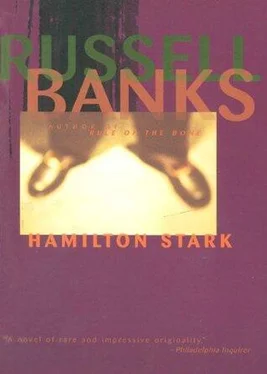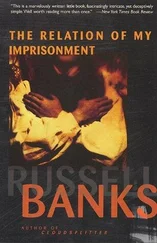Russell Banks
Hamilton Stark
for Mary — still, and again
“The individual has a host of shadows, all of which resemble him and for the moment have an equal claim to authenticity.”
— Kierkegaard, Repetition
Chapter 1. By Way of an Introduction to the Novel, This or Any
IT DIDN’T OCCUR TO ME to write a novel with A. As the prototype for its hero, Hamilton Stark, until fairly recently, a year ago this spring, when I drove the forty miles from my home in Northwood across New Hampshire to his home outside the town of B. Upon written invitation (via post card, as was his habit), I was on my way to visit him for the afternoon and possibly the evening. The post card read:
4/12/74. If you don’t show up here Sat. with a fifth of CC and a case of Molson I’ll stop up your plumbing with my toe. Number 5 has gone back to Mother and I’ve gone back to my old habits. Bring me a box of 30.06 rifle shells too. We’ll do some shooting. A.
Typically, he had typed his message, and the four-color photograph printed on the reverse side was of a building he had helped construct, in this case a Tampax factory in the southwestern part of the state. A. was a pipefitter with a wide range of practical engineering skills, and on that job he had been the foreman for all the plumbing, heating and air-conditioning systems.
After leaving my home around noon, I stopped in Concord, the state capital, and as instructed, purchased a fifth of Canadian Club whiskey and a case of Molson ale, which also happens to be Canadian. A. loved practically everything Canadian and thought Canada a truly “civilized” country, especially its far northern regions, where no one lives. “Up there,” he once told me, “there’s so many rocks and so few people, the people act like rocks. There aren’t even any goddamn trees up there, once you get far enough north! Now that’s class, ” he pronounced.
I had nodded my head in agreement, as was my habit, but I wasn’t actually sure — wasn’t sure that I agreed with him, of course, but also was not sure that he had meant what he had said, that he hadn’t been criticizing the Canadian landscape and people rather than praising them. I didn’t bother to pursue the subject; I knew my confusion at his ambiguous tone would only have been compounded by the further, inclusive, ambiguously hostile pronouncements that he would have heaped upon my head. He was like that. Once he perceived a crack in his listener’s confidence in the meaning and intent of his remarks, he gleefully hurled himself like a boulder against the crack until he had split the egg of assured understanding wide open and had it lying in pieces like Humpty Dumpty at the bottom of the wall. And like a fallen Humpty Dumpty, the listener always felt foolish and guilty, as if the fall and the consequent shattering were all his own fault, a just punishment for his exceeding pride.
In many ways, A. was a peculiar man.
I was saying, though, that I had left Concord, and a half-hour later, as I was driving past the pink and aqua house trailers along the road, the two-room shacks with rusted stovepipes poking through the roofs, the old farmhouses boarded up or half-covered against the winter with flapping sheets of polyethylene, the fields compulsively cleared by long-dead generations of Yankee farmers gone now in this generation to scrubby choke-cherry and gnarled stunted birch, saw the gap-toothed children with matted hair and dirty rashes on their round faces playing by the side of the road, glimpsed in windows the blank, gray faces of young women and the old men’s and old women’s faces collapsing like rotted fruit, the broken toys and tools and ravaged carcasses of old cars lying randomly in the packed-dirt yards, the scrawny yellow mongrels nastily barking from the doorsteps at my passing car — as I drove through this melancholy scene and thus neared the home of A., it occurred to me for the first time that I might write a novel with A. as the prototype for its hero.
I will tell you how I arrived at such a notion.
It fascinated and amazed me that a person born into squalor such as this could grow to his adulthood in that same neighborhood and yet could possess qualities which, upon close examination, could be seen as both wisdom and passion.
How was that possible? I asked myself.
And then I asked myself if A. possessed these qualities (wisdom and passion), in fact, or if he were merely peculiarly mad. But on the other hand, I countered, even if he were peculiarly mad, and if his peculiar madness, which sometimes took forms that could be construed as wisdom and passion, happened to be a condition necessary for the man’s mere survival — after having been born and raised in social circumstances that ordinarily dun a human being to death, turning him wormy with passive, quiet desperation long before he reaches adolescence — why, then madness was indeed wisdom, and to cling to such madness was passion!
That way, spiritual survival became, in my eyes, self-transcendence, practically an evolutionary move on the part of the organism. The question of love, its mere possibility, a question that had haunted me in my long consideration of A.’s character, thereby became wholly irrelevant. He was beyond offering love, above it and superior to it — at least the kind of love that I, from my indulgent background, had learned long ago to value in myself and seek from others.
This was, for me, a welcome series of insights, and I felt greatly relieved, as if from a dreaded, demeaning chore, like cleaning out a septic tank. I thought: Any person whose life provides us with that particular relief is worth writing a novel about. For who among us has not wished to be freed of his need to love and be loved?
It was with considerable excitement, then, that I approached the turnoff from the paved to a dirt road, practically a trail, that led through a quarter-mile of approximately flat and unkempt fields to A.’s home. The fields on both sides of the deeply rutted road, lined with slowly collapsing stone walls, had retreated to furzy bushes and scrambling tangles of wild blackberries, sumac, and poison ivy. Scattered over the fields in no discernible pattern were ten or twelve rusting shells of windowless cars and trucks, some of them further decomposed and more nearly destroyed than others, also several farm vehicles — harrows, plows, cultivators — a one-handled wheelbarrow, an outhouse lying awkwardly on its side, rusty bedsprings and swollen mattresses spitting yellowish stuffing onto the ground, a pile of fifty-gallon oil drums, an engine block and a transmission housing, both lying atop a child’s crushed red wagon which lay atop an American Flyer sled in splinters, next to a refrigerator (with the door invitingly open, I noticed), and a red, overstuffed couch which had been partially destroyed by fire. None of this wreckage was new to me. I had observed, enumerated, and reflected on all of it many times, both alone and with friends, especially with my friend C. (about whom more later).
The fields and the road were all part of A.’s property, but a stranger, noting the broad, carefully maintained lawns, gardens, house and outbuildings which spread out from the closed gate at the end of the cluttered fields, would surely infer two separate and probably quarreling owners, one for the fields and badly maintained roadway, another for the house and grounds. But that was not the case. A. was fastidious and energetic, even compulsive, about the maintenance of the house and the yards, gardens and outbuildings that surrounded it. The region that lay beyond the white, iron rail fence, however, he cared for not at all, even though some seven hundred acres of that region was his private property, had been deeded to him with the houses and outbuildings by his parents.
Читать дальше












